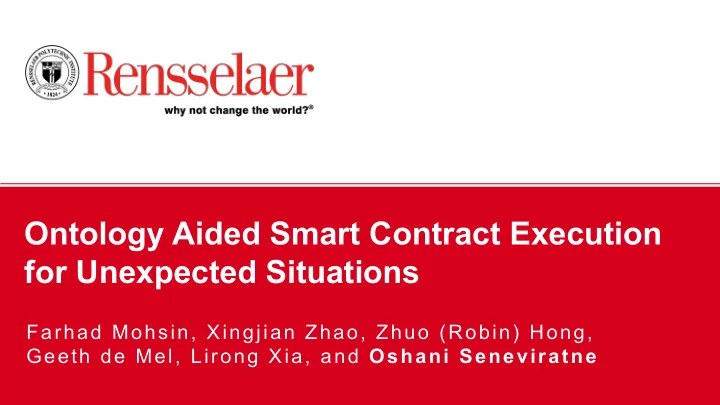

Ontology Aided Smart Contract Execution for Unexpected Situations Farhad Mohsin, Xingjian Zhao, Zhuo (Robin) Hong, Geeth de Mel, Lirong Xia, and Oshani Seneviratne
Blockchain and Smart Contract • Blockchain enables trustworthy data sharing between untrusting parties in a tamper-proof manner • Smart contracts enables us to add logic to govern updates via transactions • Once the smart contracts are set in motion, they cannot be changed! Can we predict, detect, and fix unexpected situations in smart contracts? 2 10/27/19
Limitations of Smart Contracts • Immutable • No way out for a break-glass-in-case-of-emergency scenarios • Need to foresee all unexpected situations • We need a solution when smart contracts aren’t as smart as they need be Our Proposal Use Oracles to change how smart contracts execute, so unexpected situations may be resolved 3 10/27/19
Oracles in Blockchain • Trusted system for information transfer • Good for extending smart contracts with off-chain complex logic • To integrate volatile knowledge, e.g., stock price • Complex business rules https://developer.ibm.com/articles/cl-extend-blockchain-smart-contracts-trusted-oracle/ 4 10/27/19
Ontology based Oracle for Smart Contract Execution • B lockchain to will act as a verifiable data structure • Logic for each transaction will be performed off-chain Smart Oracle Contract Send necessary data to Check if current status check transaction status satisfies conditions Return true/false on transaction constraints Completes/rejects transaction 5 10/27/19
Example: Decentralized Course Selection 4 2 nd Day 4 1 st Day Unexpected Situation A freshman student with a very CS1 CS1 3 3 good GPA gets a special permission to enroll in an already full course. 2 2 1 1 But, no proper function in the original Smart Contract! 6 10/27/19
Decentralized Course Selection (DCS) Ontology Legend rdfs: = Resource Description Framework Schema dcs: = Decentralized Course Selection 7 10/27/19
Off-Chain Rule Update Initial Rule Updated Rule Student(?s) ∧ Student(?s) ∧ hasYear(?s,?y) ∧ hasGPA(?s, ?g) ∧ Course(?c) ∧ hasRequiredGPA(?c, ?rg) ∧ hasRequiredYear(?c, ?ry) ∧ hasYear(?s,?y) ∧ hasMaxCapacity(?c, ?mc) ∧ Course(?c) ∧ hasCurrentSize(?c, ?curr) ∧ hasRequiredYear(?c, ?ry) ∧ swrlb:greaterThanOrEqual(?y, ?ry) ∧ hasMaxCapacity(?c, ?mc) ∧ swrlb:lesserThan(?curr, ?mc) hasCurrentSize(?c, ?curr) ∧ → swrlb:greaterThanOrEqual(?g, ?rg) ∧ canAddCourse(?s, ?c) swrlb:greaterThanOrEqual(?y, ?ry) ∧ swrlb:lesserThan(?curr, ?mc) → canAddCourse(?s, ?c) 8 10/27/19
DCS Instance Graph 9 10/27/19
Governance Structure Strengthening Smart Contracts to • Pre-processor determines an action list Handle Unexpected Situations; • Smart Contract Execution Engine executes Shuze Liu, Farhad Mohsin, Lirong Xia, Oshani Seneviratne; International the action that was selected by the peers Conference on Decentralized Applications and Infrastructures 2019 Model Model Model asset A{ asset A{ asset A{ a1 a1 a1 a2 a2 a2 } } } participant B{ participant B{ Smart participant B{ Analyze b1 b1 b1 b2 b2 Contract b2 Smart vote_data vote_data voting Execution } } } Contract execute Script{ Script{ Script{ transaction t1{ transaction t1{ transaction t1{ change_a1() //... //... //... } } } //new //new transactions Smart transactions start_vote{} start_vote{} submit_vote{} Contract submit_vote{} Preprocessor end_vote{} end_vote{} Execution //action list //action list change_a1{} change_a1{} change_a2{} Engine change_a2{} change_b1{} change_b1{} change_b2{} change_b2{} } } 10 10/27/19
Future Work: Proposed Voting Mechanism for Updating the Ontology Initiator Other Users Smart Oracle Contract Start vote with necessary conditions for proposers and voters defined Check condition for proposers Provide users satisfying proposer constraint Request proposals from select users Submit proposals in form of Check condition for rules voters Provide users satisfying voter constraint Request votes on proposals from select users Vote on proposed rules Report winning consistent Implement consistent rule change to transaction constraints 11 10/27/19
Implementation Concerns • Rules and attributes should only be changed to an extent. • E.g. course.MaxCapacity may be changeable, student.GPA should probably not be changed • For privacy concerns, the oracle should receive data necessary for forming instances for each transaction and never store a complete knowledge graph • Update on the rules should only occur from the smart contract and protected against external tampering 12 10/27/19
Summary • Utilization of external rules to augment the smart contract logic • If there is a gap in the logic, the external oracle could be updated 13 10/27/19
Questions? senevo@rpi.edu SCALES – Smart Contracts Augmented with LEarning and Semantics https://idea.tw.rpi.edu/projects/scales 14 10/27/19
Recommend
More recommend